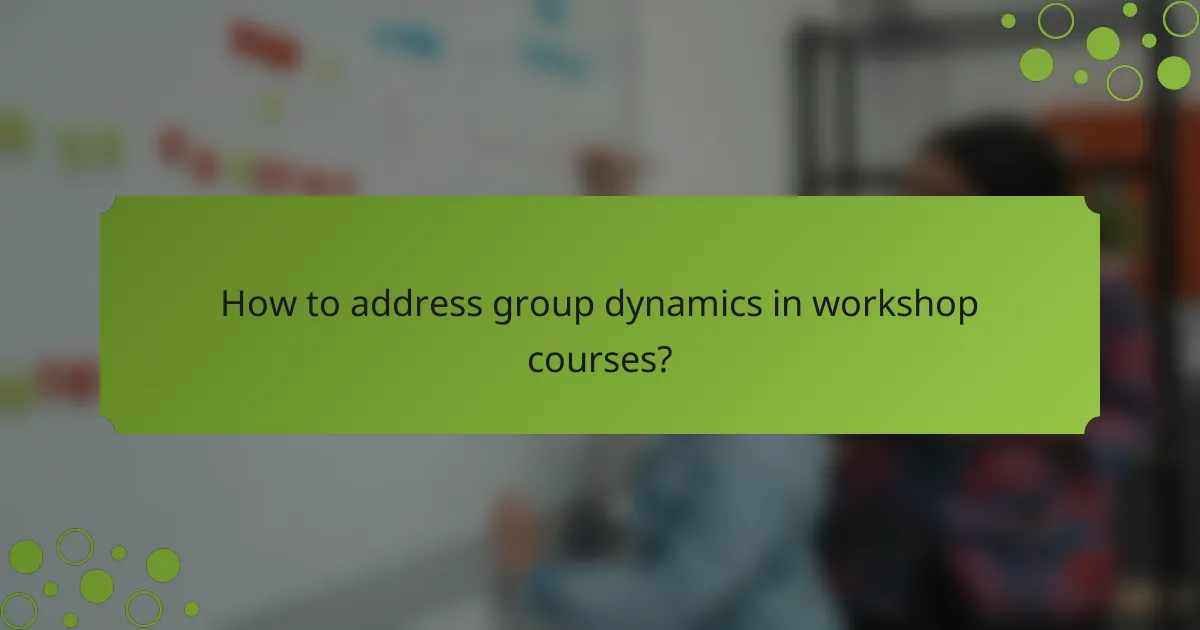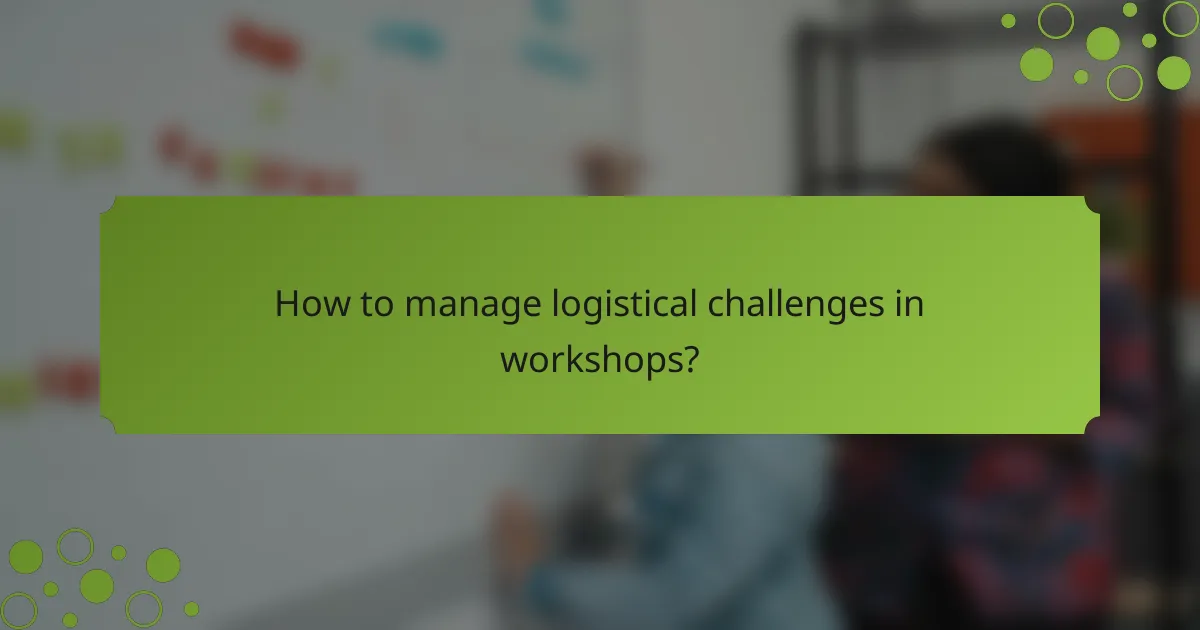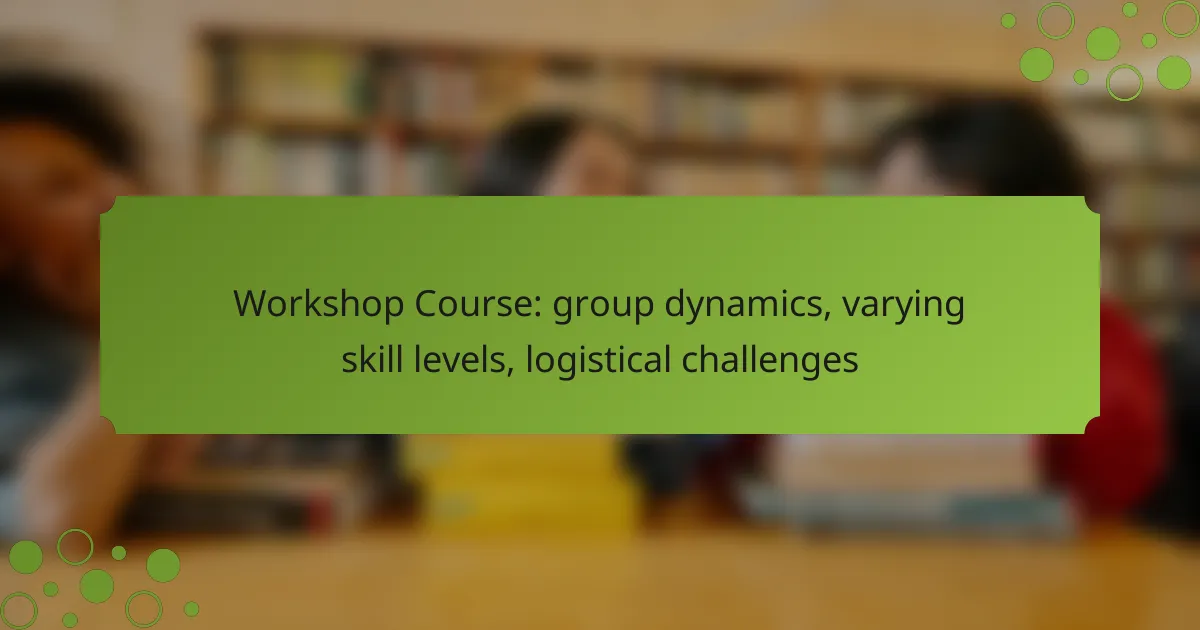In workshop courses, addressing group dynamics is crucial for fostering collaboration and enhancing learning outcomes among participants with varying skill levels. By implementing tailored strategies that support individual needs, facilitators can ensure that everyone benefits from the experience. Additionally, effective management of logistical challenges, such as scheduling and resource allocation, is essential for creating a smooth and engaging learning environment.

How to address group dynamics in workshop courses?
Addressing group dynamics in workshop courses involves understanding the interactions among participants and adapting activities to accommodate varying skill levels. Effective management of these dynamics can enhance collaboration, learning outcomes, and overall participant satisfaction.
Facilitator-led discussions
Facilitator-led discussions are essential for guiding group dynamics in workshops. They allow the facilitator to steer conversations, ensuring that all voices are heard and that participants feel valued. This approach can help identify and address any tensions or misunderstandings within the group.
To conduct effective discussions, set clear objectives and encourage open communication. Use techniques such as active listening and summarizing key points to foster engagement. Be mindful of the varying skill levels in the group, adjusting your facilitation style to ensure inclusivity.
Team-building exercises
Team-building exercises are designed to strengthen relationships among participants and improve group dynamics. These activities can range from icebreakers to more complex problem-solving tasks, depending on the group’s skill levels and objectives. Choose exercises that promote collaboration and trust, which are vital for a productive workshop environment.
Consider incorporating both physical and mental challenges to cater to different strengths. For example, a simple trust fall can build physical trust, while a group puzzle can enhance problem-solving skills. Ensure that all activities are accessible to everyone to avoid alienating any participants.
Peer feedback sessions
Peer feedback sessions encourage participants to share insights and constructive criticism with one another, fostering a culture of collaboration. These sessions can help individuals recognize their strengths and areas for improvement, enhancing overall group dynamics. Structure these sessions to ensure that feedback is specific, respectful, and actionable.
To implement effective peer feedback, establish guidelines that promote a positive atmosphere. Encourage participants to focus on behaviors rather than personal traits, and consider using a feedback framework like “I noticed… I appreciated… I suggest…” to guide discussions. This structured approach can help maintain a supportive environment while addressing varying skill levels within the group.

What strategies accommodate varying skill levels?
To effectively accommodate varying skill levels in a workshop course, it is essential to implement tailored strategies that support individual learning needs. These strategies can enhance engagement and ensure that all participants benefit from the experience.
Customized learning paths
Customized learning paths allow participants to progress at their own pace, catering to their unique skill levels. By offering different modules or tracks, instructors can ensure that beginners receive foundational knowledge while advanced learners tackle more complex topics.
For example, a workshop on digital marketing might include separate tracks for beginners focusing on social media basics and advanced learners diving into analytics and strategy. This approach helps maintain participant interest and fosters a more inclusive environment.
Skill assessment surveys
Skill assessment surveys are tools used to gauge participants’ existing knowledge and skills before the workshop begins. These surveys can help instructors tailor content and group participants according to their abilities, ensuring that everyone is appropriately challenged.
Surveys can include multiple-choice questions or practical scenarios relevant to the workshop topic. For instance, a survey for a coding workshop might ask about familiarity with programming languages or frameworks, allowing for informed decisions on group placements.
Mentorship pairings
Mentorship pairings involve matching less experienced participants with more knowledgeable peers or instructors. This strategy fosters collaboration and provides opportunities for skill development through direct interaction and guidance.
For example, in a photography workshop, a novice could be paired with an experienced photographer who can offer personalized feedback and tips. This one-on-one support can significantly enhance the learning experience and build confidence among participants.

How to manage logistical challenges in workshops?
Managing logistical challenges in workshops involves careful planning and coordination to ensure smooth operations. Key considerations include scheduling, resource allocation, and the integration of technology to facilitate the learning experience.
Effective scheduling techniques
Effective scheduling is crucial for accommodating varying skill levels and participant availability. Consider using tools like shared calendars or scheduling software to find optimal times that work for all attendees.
When planning, aim for a balance between session length and participant engagement. Sessions lasting between 60 to 90 minutes often maintain attention better than longer ones. Additionally, avoid scheduling during peak hours to minimize conflicts.
Resource allocation planning
Resource allocation involves ensuring that all necessary materials and personnel are available for each workshop session. Start by creating a checklist of required resources, including facilitators, equipment, and materials.
Consider the number of participants and their skill levels when allocating resources. For instance, if you have a mix of beginners and advanced learners, ensure that there are enough facilitators to provide personalized support. Regularly review and adjust your resource plan based on participant feedback and attendance trends.
Technology integration tools
Integrating technology can enhance the workshop experience by facilitating communication and collaboration. Tools like video conferencing software, interactive whiteboards, and learning management systems can help bridge gaps in skill levels and engagement.
Choose technology that is user-friendly and accessible to all participants. For example, platforms like Zoom or Microsoft Teams are widely used for virtual workshops and offer features like breakout rooms for small group discussions. Ensure that all participants are familiar with the tools before the workshop begins to avoid technical issues.

What are the prerequisites for successful workshop courses?
Successful workshop courses require clear learning objectives, effective participant engagement strategies, and the ability to navigate logistical challenges. These elements ensure that participants of varying skill levels can benefit from the experience and achieve desired outcomes.
Clear learning objectives
Establishing clear learning objectives is essential for any workshop course. These objectives should outline what participants are expected to learn or accomplish by the end of the session. For example, if the workshop focuses on group dynamics, objectives might include understanding team roles or improving communication skills.
When defining objectives, consider the varying skill levels of participants. Tailor objectives to be inclusive, ensuring that both beginners and advanced learners can find value. A good practice is to use the SMART criteria—Specific, Measurable, Achievable, Relevant, and Time-bound—to formulate these goals.
Participant engagement strategies
Engaging participants effectively is crucial for maintaining interest and promoting interaction during workshops. Strategies may include interactive activities, discussions, and group exercises that encourage collaboration. For instance, using role-playing scenarios can help participants practice group dynamics in a hands-on manner.
To enhance engagement, consider utilizing technology, such as polling tools or breakout rooms for smaller group discussions. Additionally, be mindful of the logistical challenges that may arise, such as varying levels of comfort with technology among participants. Providing clear instructions and support can help mitigate these issues and foster a more inclusive environment.

How to evaluate workshop effectiveness?
Evaluating workshop effectiveness involves assessing participant engagement, learning outcomes, and overall satisfaction. This can be achieved through structured feedback mechanisms and performance analysis to ensure continuous improvement.
Feedback forms and surveys
Feedback forms and surveys are essential tools for gathering participant insights on a workshop’s effectiveness. They should include questions about content relevance, delivery style, and logistical arrangements. Aim for a mix of quantitative ratings and qualitative comments to capture a comprehensive view.
Consider distributing surveys immediately after the workshop while the experience is fresh. Online tools like Google Forms or SurveyMonkey can facilitate easy collection and analysis of responses. A response rate of 70% or higher is generally considered good for actionable insights.
Performance metrics analysis
Performance metrics analysis involves evaluating specific indicators of success, such as participant skill improvement and engagement levels. Tracking pre- and post-workshop assessments can provide clear evidence of learning gains. Additionally, observing group dynamics during activities can reveal how well participants collaborate.
Establish benchmarks for success based on previous workshops or industry standards. For instance, if a workshop aims to improve skills by 20%, assess whether participants meet this target through follow-up evaluations. Regularly reviewing these metrics helps identify logistical challenges and areas for enhancement in future sessions.

What are the emerging trends in online workshop courses?
Emerging trends in online workshop courses focus on enhancing engagement, accommodating varying skill levels, and overcoming logistical challenges. These trends include the use of interactive tools, personalized learning paths, and flexible scheduling to meet diverse participant needs.
Group dynamics in online workshops
Group dynamics play a crucial role in the success of online workshops. Facilitators must foster a collaborative environment where participants feel comfortable sharing ideas and asking questions. Techniques such as breakout rooms and icebreaker activities can enhance interaction and build rapport among attendees.
To effectively manage group dynamics, consider the diversity of participants’ skill levels. Tailoring discussions and activities to accommodate both beginners and advanced learners can help maintain engagement and ensure that everyone benefits from the workshop.
Addressing varying skill levels
Addressing varying skill levels is essential for maximizing the effectiveness of online workshops. Offering pre-assessments can help identify participants’ knowledge gaps and allow facilitators to adjust content accordingly. This approach ensures that all participants receive relevant information at an appropriate pace.
Incorporating tiered activities can also be beneficial. For instance, providing basic tasks for beginners and more complex challenges for advanced learners encourages participation and fosters a sense of achievement across skill levels.
Logistical challenges in online workshops
Logistical challenges can hinder the smooth execution of online workshops. Common issues include technology failures, scheduling conflicts, and varying time zones among participants. To mitigate these problems, it’s important to conduct thorough tech checks before the workshop and offer multiple time slots to accommodate different schedules.
Creating a detailed agenda and sharing it in advance can help participants prepare and stay engaged. Additionally, recording sessions allows those who cannot attend live to access the material later, ensuring that everyone has the opportunity to learn despite logistical hurdles.



